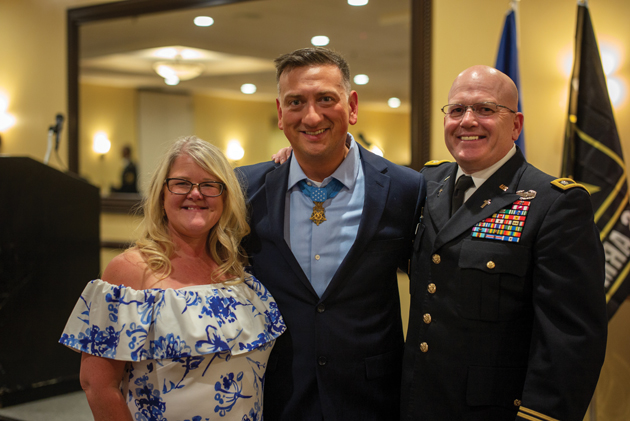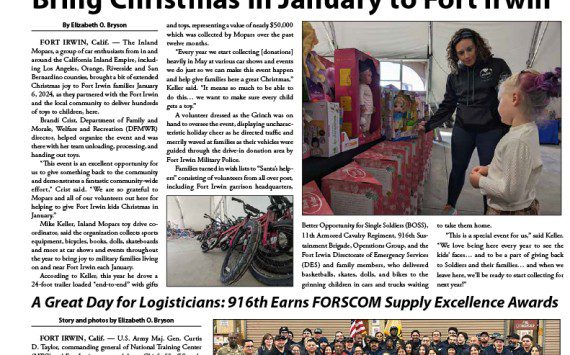In late December 2018, former US Army Staff Sgt. David Bellavia was anxiously waiting in his New York home for a phone call from the Department of Defense. The call had been cancelled a number of times.
He had no idea why the DoD would be calling, he speculated that it could be anything, maybe good news, maybe not.
The phone finally rings.
“Your call is coming in five minutes, you good to take it? A confident sounding Army colonel says to him.
After what seems like a lifetime, he gets the call.
“Hi David, this is Madeline form President Trump’s office. How are you?”
“Uhh. I’m … ahh. I am fff. I am, I am doing alright,” Bellavia stammers.
“Good. David, I have the president of the United States on hold on the phone for you. Can you please take the call?”
– From “House to House, A Soldier’s Memoir” by Staff Sergeant David Bellavia with John R. Bruning
In that phone conversation with President Donald Trump, Bellavia learned that he was to receive the Medal of Honor for his actions in Fallujah, Iraq, in 2004. Trump presented him with the Nations highest award during a ceremony in the White House on June 25, 2019 making Bellavia the only living Medal of Honor recipient from the War in Iraq.
Bellavia was assigned to Company A, Task Force 2-2, 1st Infantry Division. In the early evening hours of November 8, 2004, Alpha Company rolled thru a breach in the defensive perimeter of the City of Fallujah and into some of the fiercest fighting since Vietnam.
After clearing the breach, the unit moved to the edge of the city. Although they could hear fierce fighting to the East and West, they initially encountered little resistance. As they cleared the buildings in their sector, off to the West, soldiers from the Iraqi Intervention Force were receiving more than their share of attention from the insurgents defending the city.
Command Sgt. Maj. Steven Faulkenburg was with the IIF when they stalled at the edge of the city. As the insurgent forces closed in, Faulkenburg realized the only chance the IIF would have was to attack. Dismounting from his vehicle, he led the assault down the open street in front of them. Suddenly, enemy fire erupted from windows on both sides of the street. Faulkenburg was struck by a round from an insurgent sniper. Inspired by his actions, the IIF forces continued the fight and drove back the insurgent counterattack. The loss of the Command Sergeant Major would rock the entire battalion.
Meanwhile, Bellavia and Staff Sgt. Colin Fitts lead their squads, searching buildings. After clearing one, multi-story building, they spot a lone insurgent approaching their position through the courtyard behind the structure. The insurgent is carrying a rifle, and an automobile battery. They engaged and defeat the single insurgent but wonder about the battery. They wouldn’t have to wonder long.
Bellavia sent one of his teams to enter the building across the courtyard. As the first team, led by Sgt. Charles Knapp arrives at the entrance of the building, Knapp freezes at the doorway. As Bellavia and the rest of the platoon approach, he yells at Knapp to get inside the building and under cover. When he reaches Knapp, he realizes why his team leader froze. The entire building was rigged as a giant, improvised explosive device. Had the insurgent with the battery been able to activate the electrical triggers, the building would have exploded and taken out the entire platoon and possibly a large part of Alpha Company.
Three days into the house to house fight, the members of Alpha Company are exhausted. Cuts, minor bullet wounds and burns are the norm for the team. In the bacteria-rich environment, every scratch is showing signs of infection. Constant fighting, lack of sleep and food are beginning to take a toll on the men. Then they finally learn the fate of Command Sgt. Maj. Faulkenburg.
Just after midnight, the platoon enters a home surrounded by a courtyard and a nine-foot exterior wall. The home shows almost no signs of the fierce fighting raging around Fallujah. The front door is open and Fitts leads a team into the building, thru the entry hall into the living room. It turns out to be a trap.
The insurgents spring the ambush, firing from reinforced positions almost impossible for the soldiers to return fire. Fitts and most of the platoon is trapped and Bellavia and a couple of soldiers are stopped just shy of the kill zone.
Bellavia sends the other soldiers out to provide cover fire, and after finding no other option, steps into the kill zone and directly engages the entrenched insurgents. It works, the insurgents are temporarily confused and fire wildly.
During the melee, all the platoon members are able to move out of the building, to the protection of the exterior wall.
Bellavia, knowing that there is no other way to clear the building except meeting the enemy head on, makes the decision to re-enter the building. After pausing in the front hallway for a moment, he steps around the corner to face the first two insurgents face to face.
He takes out one and injures the second who runs into the adjoining kitchen. Bellavia finds himself alone, one enemy combatant in the kitchen in front of him, at least one upstairs from his position, and an uncleared room behind him.
The insurgent in the kitchen charges and he is taken out with several well-placed rounds from Bellavia’s rifle.
He heads up the stairs, his night vision broken, he strains to see into the darkness. From a room on the second floor, a shadowed figure fires at him. He returns fire, ending the fight. Almost immediately a tracer round narrowly misses him and hits the wall behind him.
Two more rounds impact the wall behind him, there is someone else in the room, but he can’t see anyone. As he nears an armoire at the far side of the room, the doors burst open and the gunman bursts into the room. They exchange gunfire, the insurgent escapes upstairs.
Soon Bellavia hears someone in the stairwell, slowly approaching his position. Bellavia sees a figure lean into the room and fires, hitting the insurgent in the shoulder. As he heads to the stairwell, both bodies are gone, a trail of blood leading back to the kitchen.
He decides to go after the insurgent upstairs. Nearing the top of the stairs, he slips on the blood-soaked floor. As he falls, there is a flash of light from the rifle of the insurgent. He pulls a grenade from his belt, pulls the pin and tosses it into the room.
After the explosion, he enters the room and finds the insurgent wounded but still able to fight. The room is full of propane tanks and gasoline barrels, he doesn’t dare fire his rifle. The insurgent raises his rifle, Bellavia hits him with the butt of his weapon. During the fight, both men lose their weapons and fight with their bare hands. Bellavia removes his Kevlar helmet and uses it as a weapon to silence the enemy. He finally gets a hold of his knife and finishes off the insurgent.
Exhausted, barely conscious, he finds his rifle just as another insurgent jumps off the third floor to the balcony just feet from Bellavia. The insurgent, possibly injured from the fall, tries to run, Bellavia fires, striking the fighter, who falls off the roof to the courtyard below.
It’s finally over.
When Bellavia accepted the medal, he knew that his life was about to change. For him, it’s not about his diving headfirst into the battle, it’s about the other soldiers that were with him. It’s about something bigger than one person.
NTC command chaplain, Lt. Col. Richard Brown knows about what happened in those days in Fallujah. Assigned as the battalion chaplain, Brown spent many hours getting to know the men in Alpha Company, especially Staff Sgt. David Bellavia.
Brown summed up Bellavia’s actions this way, “In combat it’s not always about American Pie and freedom. It’s about surviving to get home and making sure you get your battle buddies home. And he was about making sure his team got home.”












